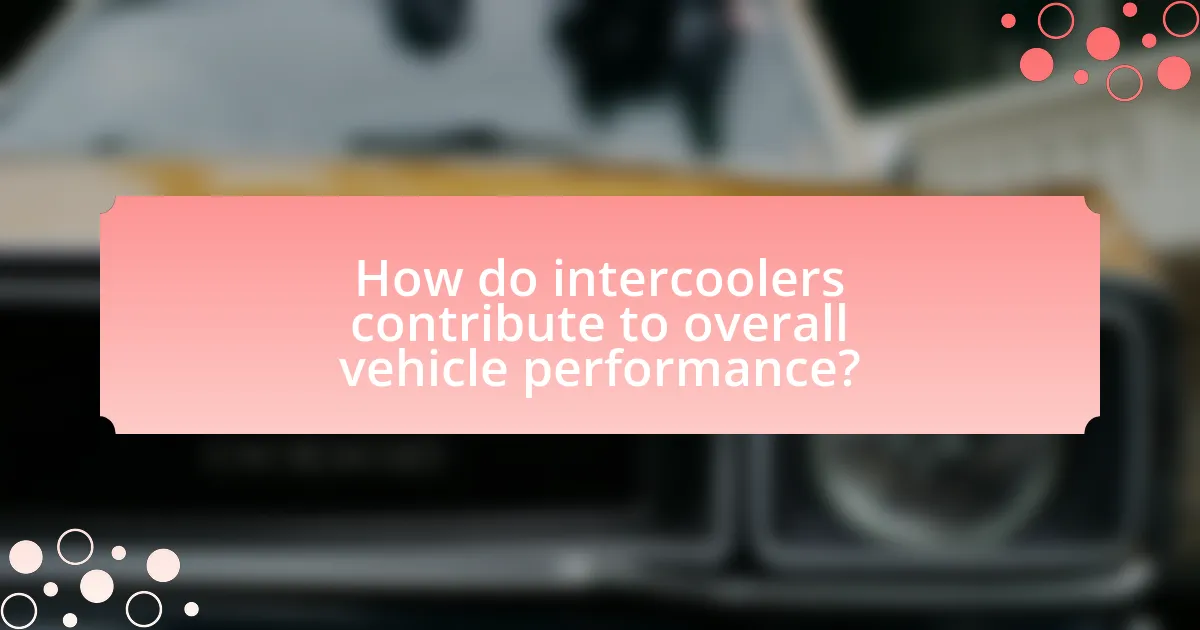Intercoolers are essential components in enhancing the performance of Volkswagen (VW) engines by cooling the intake air before it enters the combustion chamber. This cooling process increases air density, allowing for improved combustion efficiency, higher power output, and better fuel efficiency. The article explores the function of intercoolers within VW engines, their key components, and the impact of temperature on engine performance. It also discusses the importance of intercoolers for turbocharged engines, the differences between air-to-air and air-to-water intercoolers, and the common challenges associated with their installation and maintenance. Additionally, the article highlights the performance gains from upgrading intercoolers and provides best practices for selecting and installing intercoolers to optimize engine performance.

What is the role of intercoolers in enhancing VW engine performance?
Intercoolers play a crucial role in enhancing VW engine performance by reducing the temperature of the intake air before it enters the engine. Cooler air is denser, allowing for a greater volume of oxygen to be packed into the combustion chamber, which leads to improved combustion efficiency and increased power output. Studies have shown that intercoolers can lower intake air temperatures by as much as 50 degrees Fahrenheit, significantly enhancing engine performance and efficiency. This temperature reduction not only boosts power but also helps prevent engine knock, thereby improving overall reliability and longevity of the engine.
How do intercoolers function within VW engines?
Intercoolers function within VW engines by cooling the compressed air from the turbocharger before it enters the engine’s intake manifold. This cooling process increases air density, allowing for more oxygen to enter the combustion chamber, which enhances engine performance and efficiency. The effectiveness of intercoolers is supported by the fact that cooler air can lead to a significant increase in horsepower and torque, as well as improved fuel efficiency, which is crucial for turbocharged engines commonly found in VW models.
What are the key components of an intercooler system?
The key components of an intercooler system include the intercooler core, inlet and outlet pipes, a cooling fan, and a mounting bracket. The intercooler core is responsible for cooling the compressed air from the turbocharger or supercharger, which enhances engine performance by increasing air density. Inlet and outlet pipes facilitate the flow of air to and from the intercooler, ensuring efficient air transfer. A cooling fan may be used to improve airflow through the intercooler, especially in high-performance applications. The mounting bracket secures the intercooler in place within the engine bay, ensuring stability and proper alignment. These components work together to optimize the cooling process, ultimately contributing to improved engine efficiency and power output.
How does the cooling process affect engine efficiency?
The cooling process significantly enhances engine efficiency by maintaining optimal operating temperatures, which prevents overheating and allows for better combustion. When an engine operates at the correct temperature, it can achieve a more complete fuel burn, leading to improved power output and reduced fuel consumption. For instance, studies have shown that engines with effective cooling systems can improve thermal efficiency by up to 10%, as they minimize energy losses associated with excessive heat. This efficiency is crucial in performance applications, such as in VW engines, where intercoolers play a vital role in cooling the intake air, thus further enhancing combustion efficiency and overall engine performance.
Why are intercoolers important for turbocharged VW engines?
Intercoolers are crucial for turbocharged VW engines because they reduce the temperature of the compressed air before it enters the engine, enhancing performance and efficiency. When air is compressed by the turbocharger, its temperature increases, which can lead to reduced engine performance and potential knock. By cooling this air, intercoolers increase its density, allowing for more oxygen to enter the combustion chamber, resulting in improved power output and fuel efficiency. Studies show that intercoolers can lower intake air temperatures by as much as 50 degrees Fahrenheit, significantly optimizing engine performance and longevity.
What impact does temperature have on engine performance?
Temperature significantly impacts engine performance by influencing combustion efficiency and thermal management. Higher temperatures can lead to increased engine wear, reduced power output, and potential overheating, while lower temperatures may enhance fuel efficiency and power but can also cause incomplete combustion. For instance, optimal operating temperatures improve the vaporization of fuel, leading to better combustion and power generation. Conversely, excessive heat can cause knocking and engine damage, as evidenced by studies showing that engines operating above 220°F (104°C) experience a decline in performance and longevity.
How do intercoolers prevent engine knock and detonation?
Intercoolers prevent engine knock and detonation by lowering the temperature of the intake air before it enters the engine. Cooler air is denser, which allows for a higher volume of oxygen to mix with fuel, leading to more efficient combustion. This efficient combustion reduces the likelihood of pre-ignition and detonation, which are caused by excessive heat and pressure in the combustion chamber. Studies have shown that intercoolers can reduce intake air temperatures by as much as 50 degrees Fahrenheit, significantly improving engine performance and reliability.
What types of intercoolers are used in VW engines?
VW engines typically use two main types of intercoolers: air-to-air intercoolers and air-to-water intercoolers. Air-to-air intercoolers utilize ambient air to cool the intake charge, which is common in many turbocharged VW models, while air-to-water intercoolers use a water-based cooling system to achieve more efficient temperature reduction, often found in high-performance applications. The effectiveness of these intercoolers is crucial for maintaining optimal engine performance and preventing knock, as cooler intake air increases density and improves combustion efficiency.
What are the differences between air-to-air and air-to-water intercoolers?
Air-to-air intercoolers use ambient air to cool the intake charge, while air-to-water intercoolers utilize water as a cooling medium. Air-to-air intercoolers are typically simpler and lighter, relying on airflow to dissipate heat, making them effective in high-speed applications. In contrast, air-to-water intercoolers can provide more consistent cooling, especially in situations where airflow is limited, as water has a higher heat capacity than air. This allows air-to-water intercoolers to maintain lower intake temperatures under various conditions, enhancing engine performance.
How do different intercooler designs affect performance?
Different intercooler designs significantly affect engine performance by influencing the efficiency of air cooling and density. For instance, air-to-air intercoolers typically provide better cooling efficiency compared to air-to-water designs due to their larger surface area and direct exposure to airflow, which can lead to lower intake temperatures and increased horsepower. Additionally, bar-and-plate intercoolers often outperform tube-and-fin designs in terms of heat dissipation and pressure drop, resulting in improved throttle response and overall engine performance. Studies have shown that a well-designed intercooler can reduce intake air temperatures by up to 50 degrees Fahrenheit, directly correlating with a 5-10% increase in engine power output.

How do intercoolers contribute to overall vehicle performance?
Intercoolers enhance overall vehicle performance by reducing the temperature of the air entering the engine, which increases air density and improves combustion efficiency. Cooler air allows for a greater volume of oxygen to enter the combustion chamber, leading to more power and better fuel efficiency. Studies show that intercoolers can improve engine performance by up to 10-20% in turbocharged vehicles, as they help maintain optimal operating temperatures and prevent engine knock. This efficiency is crucial for vehicles like VW models, where performance and reliability are paramount.
What performance gains can be expected from upgrading an intercooler?
Upgrading an intercooler can yield significant performance gains, typically resulting in increased horsepower and torque. Enhanced cooling efficiency allows for denser air intake, which improves combustion and engine efficiency. Studies have shown that a larger or more efficient intercooler can lead to power increases of 10-20% in turbocharged engines, as cooler air reduces the likelihood of knock and allows for more aggressive tuning. This performance enhancement is particularly beneficial in high-performance applications, where maintaining optimal air temperatures is crucial for maximizing engine output.
How does an intercooler upgrade influence horsepower and torque?
An intercooler upgrade significantly increases horsepower and torque by improving the efficiency of the engine’s intake air. By cooling the compressed air from the turbocharger or supercharger, the intercooler reduces the air temperature, which allows for a denser air charge to enter the engine. This denser air charge leads to better combustion, resulting in higher power output.
For example, studies have shown that upgrading to a high-performance intercooler can yield horsepower gains of 10-20% and torque increases of 5-15% in turbocharged engines. This improvement is due to the intercooler’s ability to lower intake air temperatures by as much as 30-50 degrees Fahrenheit, enhancing the overall thermal efficiency of the engine.
What role does an intercooler play in fuel efficiency?
An intercooler enhances fuel efficiency by cooling the intake air before it enters the engine, which increases air density and allows for more oxygen to be available for combustion. This improved combustion efficiency leads to better fuel utilization, resulting in increased power output without a proportional increase in fuel consumption. Studies have shown that engines equipped with intercoolers can achieve up to a 10-20% improvement in fuel efficiency compared to those without, as cooler air reduces the likelihood of knock and allows for more aggressive tuning of the engine’s performance parameters.
How do intercoolers interact with other engine components?
Intercoolers interact with other engine components by cooling the compressed air from the turbocharger or supercharger before it enters the engine’s intake manifold. This cooling process increases air density, allowing for more oxygen to enter the combustion chamber, which enhances combustion efficiency and power output. Additionally, intercoolers work in conjunction with the engine’s fuel system, as the increased air density requires a corresponding increase in fuel delivery to maintain the optimal air-fuel ratio for combustion. This interaction is crucial for preventing engine knock and optimizing performance, particularly in turbocharged VW engines, where maintaining lower intake temperatures can significantly improve overall engine efficiency and longevity.
What is the relationship between intercoolers and turbochargers?
Intercoolers and turbochargers are closely related components in forced induction systems, where turbochargers compress air to increase engine power, and intercoolers cool this compressed air before it enters the engine. The cooling process performed by intercoolers is essential because compressed air from turbochargers is heated, which can reduce its density and lead to engine knock or reduced performance. By lowering the temperature of the intake air, intercoolers enhance the efficiency of the turbocharger, allowing for more oxygen to enter the combustion chamber, resulting in improved power output and engine performance.
How do intercoolers affect the intake system of VW engines?
Intercoolers significantly enhance the intake system of VW engines by lowering the temperature of the compressed air before it enters the engine. This cooling effect increases air density, allowing for a greater volume of oxygen to be available for combustion, which in turn improves engine efficiency and power output. Studies have shown that reducing intake air temperature by even a few degrees can lead to noticeable performance gains, as cooler air contributes to more effective combustion and reduced chances of knock. Thus, intercoolers play a crucial role in optimizing the performance of VW engines by ensuring that the intake air is as dense and cool as possible.

What are the common challenges associated with intercoolers in VW engines?
Common challenges associated with intercoolers in VW engines include heat soak, pressure drop, and potential leaks. Heat soak occurs when the intercooler absorbs excessive heat, reducing its efficiency in cooling the intake air. Pressure drop refers to the loss of boost pressure as air passes through the intercooler, which can lead to decreased engine performance. Additionally, intercoolers may develop leaks due to wear or damage, compromising their ability to function effectively. These issues can significantly impact the overall performance and reliability of VW engines.
What issues can arise from intercooler installation?
Issues that can arise from intercooler installation include improper fitment, which can lead to air leaks, and inadequate cooling efficiency, resulting in higher intake temperatures. Additionally, incorrect routing of piping may cause restrictions in airflow, negatively impacting engine performance. Furthermore, the installation process can introduce potential for damage to surrounding components if not executed carefully. These problems can ultimately lead to decreased engine performance and reliability, as evidenced by reports from automotive technicians highlighting the importance of precise installation techniques.
How can improper intercooler sizing affect performance?
Improper intercooler sizing can significantly degrade engine performance by either causing excessive intake air temperatures or insufficient cooling. When an intercooler is too small, it fails to adequately cool the compressed air, leading to higher intake temperatures that can result in reduced engine efficiency and increased risk of knock. Conversely, an oversized intercooler may introduce excessive pressure drop, hindering airflow and negatively impacting turbocharger response. Studies have shown that optimal intercooler sizing is crucial for maintaining the balance between cooling efficiency and airflow resistance, which directly influences power output and engine longevity.
What maintenance practices are necessary for intercoolers?
Regular maintenance practices for intercoolers include inspecting for leaks, cleaning the core, checking for blockages, and ensuring proper airflow. Inspecting for leaks helps identify any coolant loss that could affect performance, while cleaning the core removes dirt and debris that can hinder heat exchange efficiency. Checking for blockages ensures that air can flow freely through the intercooler, which is crucial for optimal cooling. Additionally, ensuring proper airflow around the intercooler can enhance its effectiveness, as restricted airflow can lead to increased temperatures and reduced performance. These practices are essential for maintaining the efficiency and longevity of intercoolers in enhancing engine performance.
What troubleshooting tips can help with intercooler-related problems?
To troubleshoot intercooler-related problems, first inspect for leaks in the intercooler and associated piping, as leaks can significantly reduce performance. Next, check the intercooler for blockages or debris that may impede airflow, which can lead to overheating and reduced efficiency. Additionally, verify that the intercooler is properly mounted and that all connections are secure to prevent pressure loss. Monitoring the temperature of the intake air can also provide insights; elevated temperatures may indicate a malfunctioning intercooler. Regular maintenance, including cleaning and checking for physical damage, is essential to ensure optimal intercooler function.
How can you identify signs of intercooler failure?
Signs of intercooler failure can be identified through symptoms such as reduced engine performance, increased exhaust temperatures, and visible oil or coolant leaks around the intercooler. Reduced engine performance often manifests as sluggish acceleration or a noticeable drop in power, indicating that the intercooler is not effectively cooling the intake air. Increased exhaust temperatures can occur due to insufficient cooling, leading to potential engine damage. Additionally, oil or coolant leaks around the intercooler suggest that it may have developed cracks or other damage, compromising its function. These indicators are critical for diagnosing intercooler issues and ensuring optimal engine performance.
What steps should be taken if an intercooler is leaking?
If an intercooler is leaking, the first step is to identify the source of the leak by visually inspecting the intercooler and associated piping for any signs of damage or moisture. Once the leak is located, the next step is to remove the intercooler from the vehicle, which typically involves disconnecting the intake and outlet hoses and any mounting brackets. After removal, the intercooler should be cleaned and assessed for repair or replacement; small leaks may be fixed using epoxy or welding, while significant damage often necessitates a complete replacement. It is essential to ensure that all connections are secure and that the intercooler is properly reinstalled to prevent future leaks. Regular maintenance checks can help identify potential issues before they lead to significant problems.
What best practices should be followed for intercooler upgrades?
For intercooler upgrades, it is essential to select a high-efficiency intercooler that matches the engine’s power output and intended use. This ensures optimal cooling and performance. Additionally, proper installation is crucial; it should include secure mounting and correct routing of piping to minimize pressure loss. Using larger diameter piping can enhance airflow, while ensuring that the intercooler is adequately sized prevents heat soak. Furthermore, regular maintenance, such as cleaning the intercooler and checking for leaks, is necessary to maintain performance. These practices are supported by the fact that a well-designed intercooler can reduce intake temperatures by up to 50°F, significantly improving engine efficiency and power output.
How do you choose the right intercooler for your VW engine?
To choose the right intercooler for your VW engine, assess the engine’s power output and intended use, as these factors dictate the intercooler’s size and efficiency requirements. A larger intercooler typically provides better cooling and performance, especially for modified engines or those used in high-performance applications. Additionally, consider the intercooler’s design, such as bar-and-plate versus tube-and-fin, as this affects heat exchange efficiency and weight. Compatibility with existing engine components and installation space is also crucial, ensuring that the intercooler fits without requiring extensive modifications.
What installation tips can ensure optimal intercooler performance?
To ensure optimal intercooler performance, it is crucial to install the intercooler in a location that maximizes airflow and minimizes heat soak. Proper placement allows for efficient cooling of the intake air, which is essential for maintaining engine performance. Additionally, using high-quality silicone hoses and clamps can prevent leaks and ensure a secure connection, which is vital for maintaining pressure and temperature. Furthermore, ensuring that the intercooler is mounted securely and that all connections are tight will prevent vibrations that could lead to damage over time. These installation practices are supported by performance tuning studies, which indicate that effective intercooler placement and secure connections can significantly enhance engine efficiency and power output.


